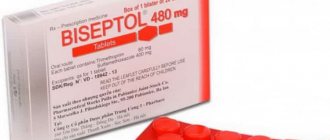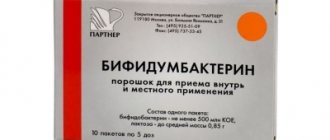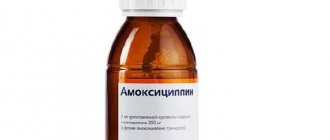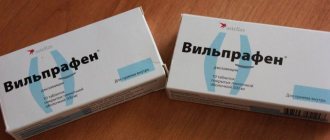9069
Author of the article
Evgeniy Nikolaevich Konoplev
Reading time: 5 minutes
AA
Ibufen is a non-steroidal antipyretic and anti-inflammatory drug. This drug has managed to establish itself in the domestic market, and for good reason. The effectiveness of the medicine is incredibly high. Patients managed to evaluate the effect of Ibufen, and many positive reviews confirm this. To understand the secret of the drug, you should consider its composition and indications for use in detail.
Release form and composition
The main active ingredient of the drug is ibuprofen. In addition to the fact that the medicine is presented as an antipyretic, it is an excellent pain reliever. Release form: suspension (syrup), tablets, Ibufen Ultra capsules and Ibufen rectal suppositories. The composition of the suspension is as follows:
- ibuprofen;
- glycerol;
- sodium benzoate;
- sodium saccharinate;
- sodium chloride;
- flavorings and water.
Ibufen D Forte suspension should be taken at elevated temperatures associated with influenza, viral infections, sore throat, and colds. The drug should also be taken as a painkiller for teething, headaches and earaches, as well as for pain caused by trauma to the musculoskeletal system.
The suspension itself is a yellowish liquid with an orange flavor. After using the drug, a slight burning sensation is possible. 5 mg of suspension contains 100 mg of ibuprofen. The drug is produced in cardboard packaging with a special dosage scale and instructions for use. Price in Moscow - from 89 to 93 rubles.
Ibufen
Active substance:
Ibuprofen*
Pharmgroup:
NSAIDs. Propionic acid derivatives
Analogs for the active substance:Advil Advil Liquidgels ArthroCam Bonifen Brufen Brufen retard Brufen SR Burana Deblock Children's Motrin Dolgit Ibuprom Ibuprom Max Ibuprom Sprint Caps Ibuprofen Ibuprofen Lannacher Ibuprofen Nycomed Ibuprofen-Verte Ibuprofen-Hemofarm Ibusan Ibutop gel Yprene MIG 200 MIG 400 Nurofen Nurofen for children Nurofen Period Nurofen UltraCap Nurofen UltraCap forte Nurofen forte Nurofen Express Pedea Solpaflex Faspik | Application area:Bacterial infections of the upper respiratory tract Bacterial respiratory infections Pain syndrome after injuries Pain syndrome in muscular and joint diseases Pain syndrome in muscular and joint diseases Pain syndrome with neuralgia Pain syndrome in osteoarthritis Pain syndrome in osteoarthritis Pain syndrome in acute inflammatory diseases of the musculoskeletal system Pain syndrome during teething Pain syndrome due to injuries Pain syndrome during injuries and after surgery Pain syndrome in chronic inflammatory diseases of the musculoskeletal system Pain syndrome in chronic inflammatory diseases of the musculoskeletal system Pain in the muscles Pain in the joints Pain syndromes in dental practice Painful teething Muscle soreness Muscle soreness during heavy physical activity Joint pain Joint pain during heavy physical activity Painful inflammatory joint lesions Painful muscle strains Painful conditions of the musculoskeletal system Painful conditions of the musculoskeletal system Painful joint conditions Painful traumatic joint lesions Painful tooth growth Pain in the musculoskeletal system Pain in the musculoskeletal system Muscle pain Shoulder pain Pain at rest Joint pain Dentin pain Muscle pain Flu pain Viral respiratory disease Pain due to colds Viral respiratory tract infections Pain from injuries Pulp pain Traumatic pain Muscle pain Joint pain Joint pain due to injury Joint pain due to injury Pain and inflammation when stretched Musculoskeletal pain Musculoskeletal pain Pain after tartar removal Pain after dental procedures Postoperative and post-traumatic pain Pain in infectious and inflammatory diseases of the upper respiratory tract Osteoarthritis pain Pain due to joint pathology Rheumatoid arthritis pain Pain from injuries Pain in chronic degenerative bone diseases Pain in chronic degenerative joint diseases Pain during tooth extraction Pain of traumatic origin Inflammatory disease of the upper respiratory tract Inflammatory diseases of the upper respiratory tract Inflammatory diseases of the upper respiratory tract with difficult to separate sputum Inflammatory diseases of the respiratory tract Reduction of dislocation Secondary infections with influenza Secondary infections due to colds Severe pain syndrome of traumatic origin Hyperthermia malignant Deep tissue damage Deep scratches on the body Flu Flu in the initial stages of the disease Flu in children Influenza condition Influenza conditions Degenerative changes in the ligamentous apparatus Dentin pain Closed injury Difficulty secreting sputum in acute and chronic respiratory diseases Occipital and intercostal neuralgia Malignant hyperthermia Toothache Upper respiratory tract infections Upper respiratory tract infections Respiratory tract infections Respiratory and lung infections ENT infections Infectious and inflammatory diseases of the upper respiratory tract Infectious and inflammatory diseases of the upper respiratory tract and ENT organs |
Rules for using the suspension
Instructions for use of Ibufen D are included in each package. Before using the drug, you should read all the instructions in detail, consult your doctor, and only then begin treatment. The medicine is taken orally after meals. Before taking it, it should be shaken to obtain a homogeneous liquid, otherwise the suspension will be divided into two parts: the upper liquid layer and the lower sedimentary layer.
In the instructions for use of Ibufen for children, the dosage is selected based on the child’s age:
- Children from 6 to 12 months - 2.5 mg three times a day.
- From one to three years - 2.5 mg three or four times a day. You should also focus on the severity of pain and the nature of the disease.
- Children from three to six years - 5 mg three times a day.
- Six to nine years: 5 mg four times daily.
- From nine to twelve - 10 mg three times a day.
- Children over twelve years of age - 10 mg four times a day.
The suspension should be used every 6 hours. The drug begins to act after half an hour. You cannot increase or decrease the daily dose on your own.
Capsules for adults and children
Each Ibufen capsule contains 200 mg of ibuprofen. In addition, the following are used as excipients:
- potassium hydroxide;
- macrogol;
- purified water.
The drug is presented in the form of blue capsules with liquid inside. For small patients, special capsules called Ibufen Junior are produced.
This medicine should also be taken during fever caused by various infections, influenza and sore throat (in children and adults), neuralgia, menstrual pain, headaches and toothaches. Capsules should not be used if a person has allergic reactions to certain components of the drug, as well as to non-steroidal anti-inflammatory drugs.
Regarding taking medication during pregnancy and lactation, you should definitely consult a doctor. During the first six months of pregnancy, treatment should only be done under the supervision of a doctor. You should not take Ibufen in the last trimester of pregnancy.
The drug, which passes into milk in small quantities, does not cause side effects in infants. But during lactation, doctors recommend not taking the medicine or refusing to breastfeed while the mother is undergoing treatment. Take the capsule with a small amount of water. The maximum permissible number of days of treatment is 5. If the drug does not relieve pain during this time or does not lower the temperature in three days, you should consult a doctor.
As for side effects, they are not observed during the first 3 days, but malaise may appear later.
Basic information about tablets
In addition to suspension and capsules, the manufacturer also offers the buyer Ibufen in tablet form. The main active ingredient remains ibuprofen (200 mg per tablet). In addition to it, 1 tablet contains:
- potato starch.
- calcium and magnesium stearate.
- povidone.
The drug is presented in the form of a biconvex white tablet. The instructions for using Ibufen tablets say that the medicine should be taken for osteoarthritis, rheumatoid arthritis, and spondylitis. The drug also helps with inflammation of the membranes of the joints, as well as with lower back pain. Ibufen can also be taken for sprains, toothaches, headaches and earaches as a pain reliever.
After reading the instructions, special attention should be paid to contraindications. The tablets should not be taken by people who have hypersensitivity to ibuprofen, vitamin K deficiency, renal or heart failure, or by women in the 3rd trimester of pregnancy. These tablets are prohibited for pathologies of the vestibular apparatus and unstable blood pressure.
The medicine should be taken between meals. Adults are prescribed 2-3 tablets three or four times a day, but the treatment plan is drawn up by a doctor, since the dosage may vary depending on the problem. For example, for rheumatoid arthritis, you should take 4 tablets three times a day.
As for the side effects, Ibufen has the same regardless of the form of release.
Contraindications
Absolute:
- Complete or incomplete combination of bronchial asthma, recurrent nasal polyposis and paranasal sinuses with intolerance to acetylsalicylic acid or other NSAIDs (including a history);
- Active liver disease, severe liver failure;
- Progressive kidney disease, severe renal failure (creatinine clearance less than 30 ml/minute);
- Inflammatory bowel diseases;
- Erosive and ulcerative diseases of the gastrointestinal tract (including peptic ulcer of the stomach and duodenum in the acute phase, peptic ulcer, ulcerative colitis, Crohn's disease);
- Glucose-galactose malabsorption, fructose intolerance;
- Sucrase/isomaltase deficiency;
- Confirmed hyperkalemia;
- Blood coagulation disorders (including bleeding tendency, prolongation of bleeding time, hemophilia, hemorrhagic diathesis);
- Children up to 3 months;
- Hypersensitivity to the components of the drug, acetylsalicylic acid or other NSAIDs.
Relative (for the following diseases/conditions, treatment with Ibufen should be carried out with extreme caution due to the risk of complications):
- Diabetes;
- History of gastric and duodenal ulcers;
- Presence of Helicobacter pylori infection;
- Enteritis;
- Gastritis;
- Colitis;
- Liver and/or renal failure;
- Liver cirrhosis with portal hypertension;
- Nephrotic syndrome;
- Severe somatic diseases;
- Blood diseases of unknown etiology (leukopenia and anemia);
- Hyperbilirubinemia;
- Arterial hypertension, chronic heart failure;
- Children's age 3-6 months;
- Long-term use of NSAIDs;
- Simultaneous use of oral glucocorticosteroids (including prednisolone), antiplatelet agents (including clopidogrel), anticoagulants (including warfarin).
Side effects and special instructions
The instructions for use of Ibufen Forte also indicate side effects. Undesirable reactions are possible from different body systems:
- Digestive system: nausea, vomiting, diarrhea and heartburn, as well as characteristic pain in the stomach with possible irritation of its walls.
- Nervous: dizziness, depression, anxiety, drowsiness in the morning and insomnia at night, headaches, double vision.
- Blood: anemia and platelet deficiency.
- Cardiovascular: pressure surges.
- Genitourinary: cystitis, renal failure, nephritis.
- Allergic reactions in the form of rash, itching, angioedema, and Steven-Johnson syndrome are also possible
If at least one of the above symptoms occurs, you should stop using the drug and consult a doctor.
Before taking the medicine, you should pay attention to the special instructions, which are also in the instructions for use. People with renal and heart failure should take the drug with great caution. Also, if the medicine is used for a long time, a laboratory blood test should be performed.
If no positive dynamics are observed while using Ibufen, you should immediately consult a doctor. People suffering from diabetes should take into account that the drug contains sugar.
Drug interactions
- Other NSAIDs (including acetylsalicylic acid): the anti-inflammatory effect of ibuprofen decreases, side effects increase (this combination is contraindicated);
- Diuretics: their effect is weakened, the risk of developing renal failure increases (this combination is recommended to be avoided if possible);
- Vasodilators (including angiotensin-converting enzyme inhibitors): their hypotensive activity decreases;
- Oral hypoglycemic agents (especially sulfonylurea derivatives) and insulin: their effect is enhanced;
- Inducers of microsomal oxidation (phenylbutazone, rifampicin, phenytoin, tricyclic antidepressants, barbiturates, ethanol): the risk of severe hepatotoxic reactions increases;
- Cholestyramine, antacids: absorption of ibuprofen is reduced;
- Valproic acid, cefoperazone, plicamycin, cefamandole, cefotetan: the incidence of hypoprothrombinemia increases;
- Gold preparations, cyclosporines: increased nephrotoxicity of ibuprofen;
- Drugs with myelotoxic effects: increased manifestations of hematotoxicity of ibuprofen;
- Cyclosporine: its plasma concentration and the likelihood of developing hepatotoxic effects increases;
- Drugs that block tubular secretion: excretion decreases and plasma concentration of ibuprofen increases;
- Antiplatelet agents, indirect anticoagulants, fibrinolytics: their effect is enhanced, the risk of developing hemorrhagic complications increases;
- Caffeine: enhances the analgesic effect of ibuprofen;
- Digoxin, methotrexate, lithium preparations: their concentration in the blood increases.








